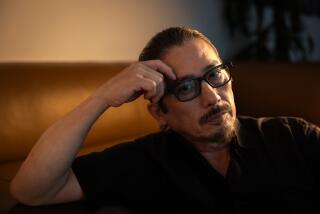Governor’s Race Is a Test Case for Japanese Reform
- Share via
NAGANO, Japan — This mountainous prefecture that played host to the 1998 Winter Olympics will be the scene of another epic event today: a political showdown between an ousted reformer and the status quo.
If the polls are right, residents will give a Bronx cheer to their prefectural assembly and reelect the flamboyant governor, whom the assembly booted in a no-confidence vote in July because of his domineering style and opposition to popular pork-barrel dam projects.
The widely watched election may be a bellwether for the rest of Japan. Voters, frustrated with the glacial pace of change here, will show whether they favor low-key leaders who operate within the system in this consensus-oriented nation or a crusader intent on making changes.
“There’s a moment when the litmus paper changes, and today’s moment is Nagano,” said the ousted governor, Yasuo Tanaka, who has taken his case for reinstatement to the people.
If they back him, that might provide him with a mandate for speedier change--or it could mean even more gridlock.
For even if Tanaka is elected, the assembly will still be in office until April--and it’s not clear whether the members will accept the public’s mandate and cooperate with him.
A well-known novelist and racy essayist with a penchant for flight attendants and Versace leather, Tanaka made national and international headlines with his radical style and opposition to the public works spending that is one of the few things stimulating depressed rural Japanese communities these days.
An independent in a land dominated by old-guard politicians and managed by entrenched bureaucrats, Tanaka was overwhelmingly elected by Nagano voters in October 2000. (In contrast, reform-minded Junichiro Koizumi of the Liberal Democratic Party was elected prime minister by his peers in parliament, as the constitution dictates.)
Newspaper surveys show Tanaka leading five opponents.
While in office, Tanaka had residents singing out their views as if in a karaoke club at the first-ever town meetings in rural hamlets across the prefecture. He vowed to cut two dam projects that were leveraging the prefecture’s and nation’s future with onerous debt.
The glass office he built for himself in the lobby of the prefectural headquarters, where gawking visitors and omnipresent television cameras scrutinized everything down to his bento lunches, became a metaphor for the kind of openness he wanted throughout the government.
At the moment, that office is dark and deserted. On July 5, 20 months after he assumed office, Tanaka became only the second Japanese governor since World War II to lose a vote of confidence in an assembly. Legislators took action after he threatened to cancel two dam projects the assembly had approved years earlier.
The assembly branded him as self-righteous and childish. He opted to run for reinstatement, saying he wanted the people to determine his fate.
Satoshi Miyazawa, 26, an office worker from Asakawa, where a dam construction project was proposed, is one supporter.
“Until now, every Nagano governor was a prefectural bureaucrat, but Tanaka was a fresh breeze from the private sector,” Miyazawa said. “Calling off the dam projects might be bad news for construction companies. But for citizens, it’s an environmental issue, and I’m all for Tanaka’s policy.”
Tanaka, 46, charges that many of the assembly members formerly worked for construction companies or are openly supported by them. The construction industry heavily backs the ruling LDP, and even in Japan’s most mountainous and out-of-the-way spots, the amount of concrete and roads-to-nowhere is astounding.
Hiroko Inadera, 38, a homemaker trying to adapt to Nagano’s quiet streets and minimal commerce after moving from bustling Osaka a year ago, complained about the stagnant economy. Two major department stores--branches of failed national chains--are shuttered, and the streets are largely empty of pedestrians.
“Tanaka is said to be autocratic and self-righteous, but that is toward the assembly,” she said before getting on her bicycle to continue her errands. “He tries to listen to citizens, or at least appears to on television.”
But Tanaka’s overwhelming popularity began to erode the more he tangled with the assembly.
“Tanaka needs to listen more to people and change his ways,” said Makoto Kitamura, 53, a taxi driver awaiting customers one recent day. “He can’t be rejecting everything. If he doesn’t make some compromises and cooperate with the assembly, he’s not going to get anything done. He’s not a politician, he’s a novelist.”
Tanaka has apparently ushered in one change: He’s inspired several candidates who are neither seasoned politicians nor bureaucrats to run against him. The most viable appears to be attorney Keiko Hasegawa, 50, who branded Tanaka a dictator at a recent rally. Hundreds of her supporters repeatedly cheered, “She’s right,” throughout the speech.
Hasegawa noted that there were high hopes for Tanaka when he took office, and cited one pundit who declared that “the alarm clock of democracy rang” with his election.
“I believe we all woke up with this alarm clock,” she continued. “But Tanaka kept his alarm ringing and eventually irritated our ears and heads. You can’t solve anything with confrontation and confusion. We need substantial debate and dialogue for real democracy.”
*
Takashi Yokota of The Times’ Tokyo Bureau contributed to this report.
More to Read
Sign up for Essential California
The most important California stories and recommendations in your inbox every morning.
You may occasionally receive promotional content from the Los Angeles Times.










